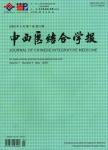Galen’s place in Avicenna’s The Canon of Medicine: Respect,confirmation and criticism
Galen’s place in Avicenna’s The Canon of Medicine: Respect,confirmation and criticism作者机构:Department of Traditional MedicineSchool of Traditional MedicineShahid Beheshti University of Medical SciencesTehran ***Iran
出 版 物:《Journal of Integrative Medicine》 (结合医学学报(英文版))
年 卷 期:2020年第18卷第1期
页 面:21-25页
核心收录:
基 金:Shahid Beheshti University of Medical Sciences SBUMS
主 题:Galen Avicenna The Canon of Medicine Persian medicine
摘 要:Galen(129–199 A.D.), an ancient Greek scholar, is one of the most influential and recognized physicians and surgeons in the history of medicine. He is one of the most influential Greek scholar in Persian medicine, who has been repeatedly cited by Iranian scholars. The purpose of this article is to describe the exact position of Galen in Avicenna’s The Canon of Medicine, the most important work of Persian medicine. In The Canon of Medicine, Galen is cited about 300 times, and Avicenna always admired and praised Galen repeatedly. Galen’s ideas were important to Avicenna, but there are also many elements of Galen’s views that Avicenna challenged or criticized. For example, Avicenna diverged from Galen’s philosophical view in medicine and rejected some of Galen’s pharmaceutical opinions and Galen’s views on the physiology of pain, the physiology of pulse, the same nature of the tendons and nerves and separation of the mind and body. Although the views of Greek scholars, especially Galen, in The Canon of Medicine have been quoted abundantly, Avicenna revised the knowledge of the ancient scholars through critical thinking and relying on observation and testing, systematized the science of medicine and introduced many ideas and innovations. As such, Europeans considered Avicenna as the most prominent physician of the Islamic Golden Age.



